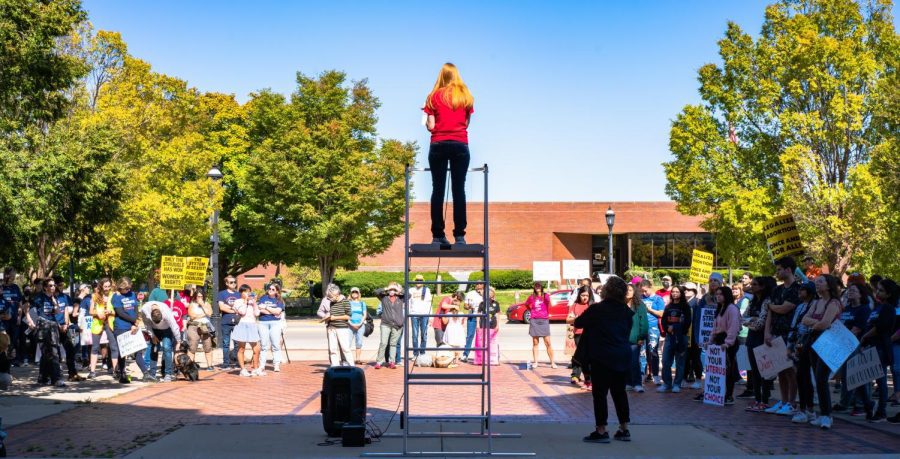100 days after Dobbs: C-U Women’s March amplifies community voices
Protestors come together at the front of the Champaign Courthouse after a march for women’s rights from Alma Matter on Sunday. 100 days after the Dobbs v. Women’s Health Organization outcome CU-community protest from Alma to the Courthouse their voices of opposition towards the decision.
October 4, 2022
State Representative Carol Ammons climbed up a ladder in front of the crowd, the Alma Mater statue behind her opening its arms, casting a huge shadow to the ground.
As Ammons shouted “my vote,” the crowd yelled back “my voice.” She shouted “my body,” and the crowd chanted “my choice.”
On October 2, nearly 100 days after the Dobbs v. Jackson Women’s Health Organization decision, Champaign-Urbana community members of all ages and backgrounds were brought together in protest for the Women’s March. Myra Bradwell’s Women’s Law Society and the University’s chapter of If/When/How organized the event as a local counterpart to the National Women’s March in Washington D.C., which is set to take place on Oct. 8.
Chloe Carpentier, a graduate student studying law and the president of If/When/How, said she believes it is wrong to allow the Supreme Court to dictate reproductive rights.
“By assembling today, hopefully, we raise some noise and make our electors aware that we’re not going to stand for this,” Carpentier said.
Get The Daily Illini in your inbox!
Emma Overton, a graduate student studying law and the president of the Women’s Law Society, added that Champaign-Urbana has done a lot to support reproductive rights, and she hopes to see the town as a health care source for people from other states.
“It’s unfortunate that we have to be out here standing up for our rights, but we’re really grateful for the support,” Overton said. “Hopefully, the sheer number of people that come out and stand up will show people that this is a serious issue and something that needs to be protected.”
Paula Enstrom, 68, said she lived in an “extremely red area” in Charleston, Ill., where people who used to believe in reproductive rights now see it as a lost cause. She said the march built camaraderie and encouraged people to fight with their voice.
As a nurse who worked in the emergency room, Enstrom said she saw tragedies when people were pregnant but not ready to have children. She said it’s important for medical professionals to advocate reproductive rights.
“If I don’t stand up for patients in our country to get the health care that they need, who’s going to do it?” Enstrom said. “No matter where you live, there are people who will stand up for our rights.”
Enstrom said that while women in Illinois are fortunate to have abortion legislation, the possibility of losing those rights is “one election away.”
Ammons said in her speech that the Supreme Court’s decision to overturn Roe v. Wade has set off a wave of female voter registrations. She said in Kansas, women accounted for over 70% of newly registered voters in the weeks after the decision, which Ammons believes every state needs to repeat.
Carla Hopkins, a retired Registered Nurse and a current volunteer at McKinley Health Center, said that now is the time to become politically active.
“It breaks my heart that we even have to be out here like this today,” Hopkins said. “It breaks my heart that we’re having to regain ground that we fought so hard for when I was young.”
On the day of the march, the League of Women Voters set up a table on the lawn beside the Alma Mater to help attendees register to vote and learn about candidates.
“Don’t get frustrated; get involved,” Ammons said. “Don’t complain; organize.”
A long line of attendees holding colorful signs over their heads marched miles from the Alma Mater to the Champaign County Courthouse. Ammons and student volunteers raised up trumpets and shouted “what does democracy look like,” and the crowd responded “this is what democracy looks like.”
Chants like “healthcare is a human right” resounded through streets mixed with several car honks from drivers and screams and claps from neighbors.
Chaundra Bishop, an Urbana City Council member, spoke to the attendees in front of the courthouse. She said she was here to remind people of their power lying in the voting booths. Bishop said she felt powerful in the crowd.
“Sometimes you sit at home by yourself, reading articles, watching the news and thinking like, ‘what can I do,’ but then you come out to events like this and you see that it’s not just you concerned about these issues,” Bishop said.
Izabella Cyran, senior in LAS, emphasized the importance to foster a supportive environment on campus full of young people learning about lives and developing opinions. With a homemade sign reading “not your uterus, not your choice” in hand, Cyran explained that many policymakers do not understand the suffering of people with uteruses.
“By limiting reproductive rights … not only is it sexist, but in a way it’s also classist because the people who will still have access are those who are more socio-economically well off than those who won’t,” Cyran said.
Diane Wall, 73, is a retired nurse. She said many people didn’t realize abortion could save a woman’s life. Working as a nurse in the late 80s, Wall saw women with ectopic pregnancies dying because some states only allowed abortion when the mother’s life is totally at risk.
Wall said she joined the march because she believes abortion should be legal and wants to elect people who share her values.
“We can only hope we can raise our voices,” Wall said. “We can shout as loudly as we can and hope people hear us. I hope it makes a change.”







